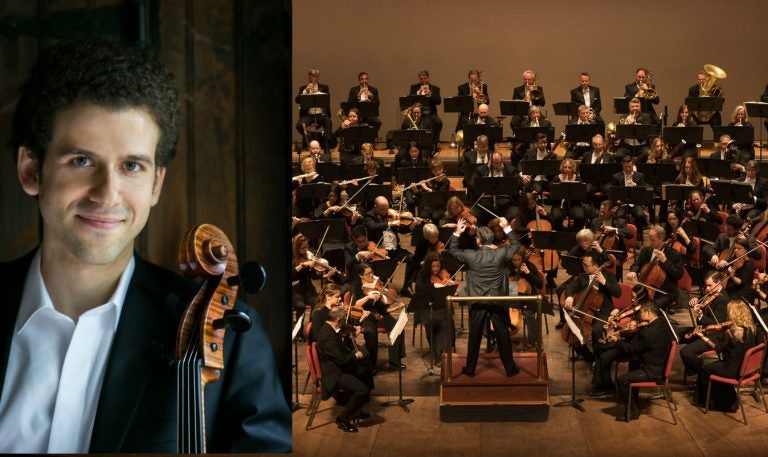Delaware Symphony ends season with cinematic flair
The Delaware Symphony Ochestra’s “Roman Hollywood” starts at 7:30 p.m. Friday, May 17, 2019, at the Grand Opera House in downtown Wilmington.

Cellist and sometimes filmmaker Nicholas Canellakis will solo as part of the Delaware Symphony Orchestra’s season finale performance “Roman Hollywood.” (Matt Dine/DSO (left); Joe del Tufo, Moonloop Photography (right))
What are the odds the Delaware Symphony Orchestra would find a cellist with a penchant for filmmaking to perform a concerto by a composer famous for his film scores in a program titled “Roman Hollywood?”
Not very good, right? Well, the DSO has beaten the odds and tonight at The Grand Opera House in Wilmington, full-time cellist and sometimes filmmaker Nicholas Canellakis will solo in Miklos Rozsa’s Cello Concerto. The program will also feature performances of Respighi’s “Fountains of Rome” and Rachmaninoff’s Symphony No. 3 in A minor, Op. 44. The concert marks Canellakis’ debut with the DSO and the conclusion of the orchestra’s 2018-19 season.
Canellakis is delighted to have the opportunity to learn and present to an audience a piece of music that neither he nor his colleagues knew existed. “I’m learning it for this performance,” he said by phone from his home in New York City. “This is not by any stretch of the imagination one of the standard concertos. It’s a very unusual piece but I’ve been delighted to learn it because I think it’s a wonderful piece.”
Rozsa, best known for his nearly one hundred film scores, composed the work for fellow Hungarian-American Janos Starker, who premiered it at the Meadow Brook Music Festival in 1970. Critics have described it as a work that is modern in idiom but by no means avant-garde, a “tough” listen with much dissonance and echoes of Bartok’s night music.
“He has a very unique language,” said Canellakis. “But you also hear a lot of different influences. There’s definitely a theatrical element to the music. You also hear his Hungarian background and some old-school Romanticism which is very much in the Hollywood tradition but mixed with some modernistic elements. I also hear a lot of Shostakovich.”
It’s also a devilishly difficult piece. “Huge, huge technical demands, an extremely difficult cello part,” said Canellakis. “Very fast, very high, very awkward. But I think the end effect is that it should be a thrilling listening experience.”
Canellakis is more than up to the challenge. Music reaches down into his DNA. Born and raised in New York City, the 34-year-old Canellakis is the son of two musicians who met while studying at The Juilliard School. His father pursued conducting, while his mother became a concert pianist. His older sister Karina is a violinist who has been named to principal conducing positions in the Netherlands and Germany.
Canellakis has accomplished much as well. He made his Carnegie Hall concerto debut in 2017 with the American Symphony Orchestra. He is an artist with the Chamber Music Society of Lincoln Center and last year was named artistic director of Chamber Music Sedona. He is a regular guest artist at many of the world’s leading music festivals. In addition, he regularly performs recitals throughout the United States with pianist/duo partner Michael Brown.
One might expect a certain amount of sibling rivalry, but not according to Canellakis. “We’ve always been very supportive of each other,” he said. In fact, he — along with Brown and violinist Elena Urioste — performed Beethoven’s Triple Concerto two years ago with the Albany Symphony Orchestra under the baton of his sister.
Canellakis also has an abiding interest in film and has written, directed, produced and acted in short films that he posts on his website. “I’ve been interested in film since I was very young but I’ve gotten more interested in making it a part of my life in the last few years,” he said. “But it’s difficult when you have a career as a full-time cellist.”
“Conversations with Nick Canellakis”—features Canellakis and Brown conducting quirky interviews with such musical luminaries as Itzhak Perlman, Leon Fleisher, Yannick Nezet-Seguin, Yuja Wang, Emanuel Ax and the Emerson String Quartet. Humorous as they are, Canellakis’ goal has never been to combine classical music and comedy a la Victor Borge.
“I love Victor Borge, but I’ve never been into classical music humor,” he said. “My goal in making these videos is 100 percent to be funny. I think a lot of the classical musicians I know are very talented, funny people on their own and you don’t need to be doing classical music-y funny things.”
Canellakis plans to play Erich Wolfgang Korngold’s Cello Concerto over the summer and feels there’s room for composers who can bridge the gap between the screen and concert stage.
“There’s a lot of bad movie music out there, but there’s a lot of good music too and that’s done by composers who are good, like John Williams and Nicholas Britell,” he said. “Their music would be good in film or on the stage.”
The Delaware Symphony Ochestra’s “Roman Hollywood” starts at 7:30 p.m. Friday, May 17, 2019, at the Grand Opera House in downtown Wilmington. A pre-concert lecture starts at 6:30 p.m. For more information and to purchase tickets, go to www.delawaresymphony.org or call 302-656-7442.
WHYY is your source for fact-based, in-depth journalism and information. As a nonprofit organization, we rely on financial support from readers like you. Please give today.




